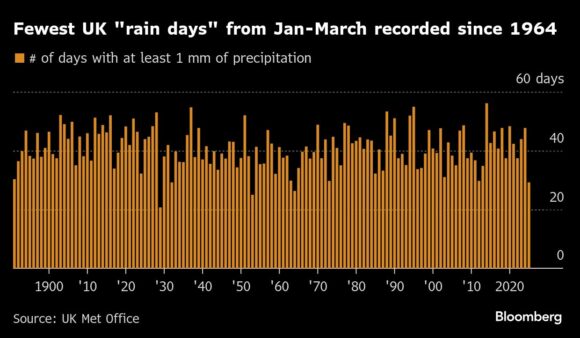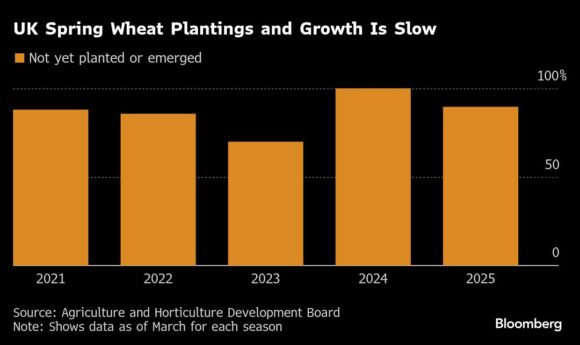The UK’s driest start to the year in four decades is threatening the country’s grain crops and increasing the risk of wildfires.
Total precipitation of about 20.5 centimeters (8.1 inches) during the first quarter was the lowest since 1985, according to Met Office data. Since then, there’s been “little appreciable” rain in the first two weeks of April, according to Lucy Barker, a senior hydrological analyst at the UK Centre for Ecology and Hydrology.
The lack of rain has been compounded by above-average temperatures, leaving farmers anxiously watching weather forecasts. The prolonged dry spell comes after the UK experienced its wettest ever 18 months in the period through March 2024, resulting in record wheat imports for a nation that’s usually close to self-sufficiency.
Europe’s Hottest Year Turbocharged Extreme Weather Across Region
Climate change has seen Europe warm twice as fast as the global average since the 1980s, triggering wild weather swings from wilting heat to the torrential downpours and flooding that hit the region last year. Now, after just three months of 2025, both the UK and Ireland are on track for one of their worst wildfire seasons in decades.

There were just six days of measurable rainfall in March, the fewest in more than 70 years, Met Office figures show.
Spring crops are struggling to germinate in parched fields, said Ben Cooper, a grain and cattle farmer in Wiltshire, England. While winter crops have been able to develop, they need a “solid day or two of steady rain” to make up for the lack of moisture, he added.
About 90% of spring wheat crops were either not yet planted or hadn’t emerged in March, according to Agriculture and Horticulture Development Board data. Following last year’s wash-out, that’s the highest level in the past five seasons.

Farmers across northern and central Europe are facing similar struggles.
A persistent high-pressure weather pattern that’s brought clear skies and a glut of market-disrupting solar generation to parts of the continent has also sapped moisture from an area spanning eastern France to the southern Nordics, as well as parts of Poland and the Baltics, according to a crop monitoring report from the European Commission.


